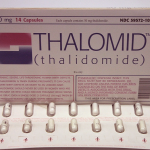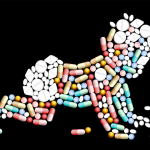COVID-19 vaccination significantly lowers the risks of severe neonatal morbidity, neonatal death, and admission to the neonatal intensive care unit in infants during the first month after birth. Protection continues for six months after birth.
birth defects
Thalidomide, one of the most infamous drugs of all, caused severe birth defects in the children of pregnant women who took the drug for nausea in the 1950s. Its story has been repeated over and over – mostly wrong. Here's why.
Recently a baby boy was born in India with two penises and four legs. How do '"parasitic twins" develop and what causes this? And what conditions prompt duplications in the female anatomy?
Maternal opioid use is growing nationally. A new study reflects this, its impact on babies and regional disparities. As a result, babies are suffering withdrawal at alarming rates. Our directives must address the symbiotic relationships that perpetuate the current and intergenerational struggles of families.
While the ongoing issue for many world-class athletes -- specifically, whether to participate in the upcoming Olympics -- comes into sharper focus, we keep hearing from those who are unsettled by the idea of heading into Brazil's Zika hot zone. And with the news that a major league pitcher has recently contracted the virus, the drumbeat for athletes to potentially skip the Summer Games is getting louder. But if they take precautions, should they?
In 1954 the German company Chemie Grunenthal first synthesized the drug thalidomide to be used as a sedative that provided sound sleep. The drug seemed safe when tested on rats it wasn t found to be toxic at all. Indeed, no matter how much was given, the rats survived.
The association between maternal use of antidepressants, especially selective serotonin reuptake inhibitors (SSRIs) during pregnancy, and birth defects in newborns and infants, has been the topic of much discussion in recent years. A new study, published in the BMJ, finds a small increased risk of two SSRIs (Paxil/paroxetine and Prozac/fluoxetine) with some birth defects, but not others (including the most commonly used SSRI,
Previous studies have suggested that pregnant women taking a commonly-prescribed class of antidepressants called selective serotonin reuptake inhibitors (SSRIs) late in pregnancy may be associated with an increased risk of persistent pulmonary hypertension of the newborn (PPHN). PPHN (also known as persistent fetal circulation) is a
It should come as no surprise to any of our readers that ACSH is unabashedly in favor of vaccinations, and appalled by groups and individuals that promote completely baseless and dangerous fears of vaccines. It is not a question of whether this paranoid mentality has cost lives, rather, how many children have died as a result of this ignorant, fearful mindset.
A new test for fetal chromosomal abnormalities seems promising, and only requires a blood test rather than a needle amniocentesis.
Attitudes toward marriage between blood relatives vary considerably across all cultures, but whatever the traditions of different cultures, there is a serious health concern regarding consanguinity (a relationship between blood relatives) - marriage between first cousins can more than double the risk of giving birth to a baby with a congenital anomaly such as heart or lung defects, or down syndrome, according to a study published in The Lancet.



